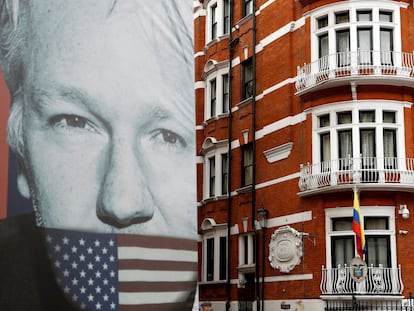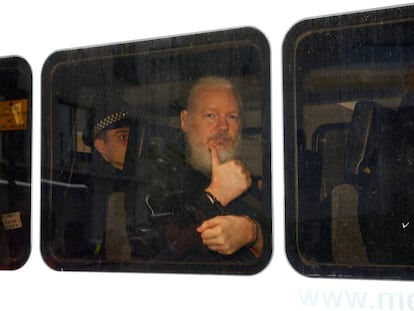Tapes of Spaniards’ attempt to extort Julian Assange: “This material is worth €3m”
EL PAÍS has accessed recordings that police made of the group who tried to sell the WikiLeaks founder sensitive personal material from his stay at the Ecuadorian Embassy in London

“Do you work for free? This material is worth €3 million. We have to put food on our tables too, you know.”
Thanks to assistance from the police, there is recorded evidence of a meeting at Madrid’s Reina Victoria Hotel in which a Spanish reporter named José Martín Santos and two computer experts attempted to sell WikiLeaks sensitive material in connection with an alleged case of spying against Julian Assange while he was living at the Ecuadorean embassy in London.
In the recorded conversation, to which EL PAÍS has had access, the alleged extortionists said that there were microphones at the embassy, and that all recorded material involving the WikiLeaks founder was being handed over to the ambassador for review. Martín and one of his associates in Alicante offered WikiLeaks the opportunity to spy on their spies, for a price. Two of the three alleged extortionists have since been arrested and are now being investigated by the courts.
If a US network gets its hands on this and starts to pick it apart and make special programs and add advertising...they won’t make three [million], they’ll make 300
José Martín Santos
The Madrid meeting took place on April 3 at 7pm. Twenty-four hours earlier, WikiLeaks editor-in-chief Kristinn Hrafnsson and Assange’s lawyer, Aitor Martínez, had met with the three would-be extortionists at the same hotel. And just a few days before that, the latter had cast their net on Twitter by offering to sell personal files about Assange’s seven-year stay at the embassy to the highest bidder.
At their second meeting, however, there were some extra guests that the sellers had not been expecting: several officers from the police Kidnapping and Extortion department, who monitored the entire conversation. Martín, a journalist who had been convicted to three years in prison for fraud in the past, opened the talks by asserting that he and his aides wanted to help the cyber-activist.
Aitor Martínez: “If you are benefactors working for freedom of expression and for Assange’s legal battle, why do you want money?”
Alejandro Mollá (computer expert): “Well... we have to put food on our tables, too.”
José Martín Santos: “Should we give it to someone else so that others can benefit from it? Someone needs to say: if this comes out in the open, someone will have to pay for it, just like everyone else... Or do you work for free?”
Martínez: “Well, I can’t really consider this to be work; in the end, it’s illegitimate spying on a person in a very sensitive situation; some lawyers who go do their work are spied on, which is also quite a serious thing, as the lawyer-client relationship cannot be spied on.”
Martín Santos: “Yes well, I did not do any of the spying.”
But who the hell photographed my legal documents?
Aitor Martínez, lawyer
Martínez: “Doctors who are also protected by privacy privileges have been spied on... I don’t know, this scheme leads from the embassy straight to you and a business is hatched... If you finally hand it over to the media, why do you need to violate my privacy as a lawyer? ... Notwithstanding my own moral and ethical considerations, Kristinn has shown me an email that says ‘from €3 million.’ I don’t know whether there’s a mistake in there, but...from €3 million upwards!”
Martín Santos: “The team provided that amount, he and I have not negotiated...[Mexican media giant] Televisa said it was ready to pay €9 million.”
Martínez: “And you didn’t sell it to them.”
Martín Santos: “No.”
Martínez: “Why not?”
Mollá: “Because besides that deal, there is an even better one.”
Martínez: “With other media?”
Mollá: “No, no, with you.”
Martín Santos: “If a US network gets its hands on this and starts to pick it apart and make special programs and add advertising... they won’t make €3 [million], they’ll make €300 million.”
The lawyer, whose notes were photographed during one of his visits to Assange at the embassy, then asks about a file that the sellers show him, titled “Communications Baltasar Garzón.” And Martín Santos replies that there are written documents from the embassy to Garzón, who was heading Assange’s legal team, and references where he shows up, as well as letters.
Do we give it to someone else so that others can benefit from it?
José Martín Santos
“Instead of having them spy on you, you can spy on them. We are giving you access to everything,” says José Martín to the editor-in-chief of WikiLeaks.
Hrafnsson and Martínez both tried to get the other parties to reveal whether the cameras at the embassy could also record sound. The answer was affirmative.
Martín Santos: “Now they do.”
Martínez: “They record sound?”
Martín Santos: “At the present time they do.”
Daniel Sánchez (computer expert): “It began a relatively short time ago.”
Martínez: “If you’re inside a room and one of the cameras is pointed at you.”
Sánchez: “Now it’s recording...but it didn’t before.”
Martínez: “There are microphones too?”
Mollá: “Yes, yes, there are microphones.”
Martín Santos: “In some cases, the recordings were done with microphones.”
Assange’s representatives then question how the men sitting across from them could possibly have accessed this material without assistance from someone inside the Ecuadorean embassy, but this mystery remains unsolved. Martín insists on describing himself a a “journalist” and denies that he or his associates are spies.
“But who the hell photographed my legal documents?” asks the lawyer. “No doubt someone inside the embassy... I didn’t get it from that somebody; that somebody gave it to another person who sent it along to me,” says Martín.
Mollá, the computer expert, then adds another piece of information, saying that on the day that the lawyer’s documents were photographed, “they took photographs of everything, scanned it and passed it along to the ambassador for him to review… that’s the way they worked.”
Records of the hotel conversation show that Martín Santos offered the editor-in-chief of WikiLeaks real-time access to all the information going on at the embassy. “Instead of having them spy on you, you could be spying on them. It sounds crazy, but it isn’t.”
Assange, 47, first filed a complaint in a Madrid court and later initiated legal proceedings at the Spanish High Court, the Audiencia Nacional, against Martín, his associates, staff at the Ecuadorean embassy in London and members of the security firm Promsecurity, who may have played a role in the spying. This company replaced an earlier security firm from Spain named Undercover Global S. L.
Following the arrest of the reporter and one of the computer experts, the Madrid court recently passed the case over to the High Court on the grounds that there is a connection between the crime of making threats and crimes against privacy and self-image committed on international soil.
In the meantime, Britain has recently rubber-stamped a US extradition request for Assange, who faces 18 charges in connection with the publication by WikiLeaks of classified information. The cyber-activist spent seven years holed up at the Ecuadorean embassy in London under the protection of the government of Rafael Correa. But when Lenin Moreno became the new president of Ecuador in 2017, Assange lost his support. He was forcibly removed from the embassy on April 11 and delivered to the British authorities.
English version by Susana Urra.
Tu suscripción se está usando en otro dispositivo
¿Quieres añadir otro usuario a tu suscripción?
Si continúas leyendo en este dispositivo, no se podrá leer en el otro.
FlechaTu suscripción se está usando en otro dispositivo y solo puedes acceder a EL PAÍS desde un dispositivo a la vez.
Si quieres compartir tu cuenta, cambia tu suscripción a la modalidad Premium, así podrás añadir otro usuario. Cada uno accederá con su propia cuenta de email, lo que os permitirá personalizar vuestra experiencia en EL PAÍS.
En el caso de no saber quién está usando tu cuenta, te recomendamos cambiar tu contraseña aquí.
Si decides continuar compartiendo tu cuenta, este mensaje se mostrará en tu dispositivo y en el de la otra persona que está usando tu cuenta de forma indefinida, afectando a tu experiencia de lectura. Puedes consultar aquí los términos y condiciones de la suscripción digital.











































